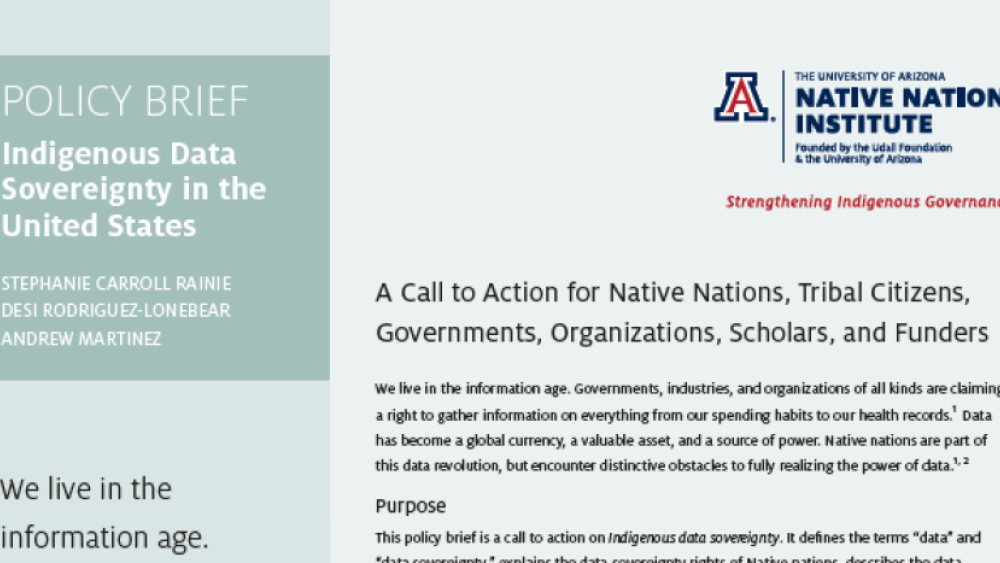Indigenous Knowledge And Data Sovereignty: A Scientist's Perspective

Table of Contents
The Importance of Indigenous Data Sovereignty
Data sovereignty, in the context of Indigenous communities, signifies self-determination and control. It's about reclaiming the narrative around their own data, ensuring its responsible use, and preventing further exploitation. Historically, Indigenous peoples have faced significant harm from the unauthorized collection and use of their data, leading to a legacy of mistrust and misrepresentation. This historical context of data exploitation underscores the urgent need for change.
- Loss of cultural heritage: Unauthorized access to data can lead to the erosion of traditional practices, stories, and cultural knowledge.
- Misrepresentation of Indigenous knowledge: Data used without proper context or consultation can perpetuate harmful stereotypes and misinterpretations of Indigenous worldviews.
- Lack of benefit sharing: Research conducted on Indigenous lands and using their knowledge often fails to provide equitable benefits to the communities involved.
- Erosion of trust: Past experiences of exploitation have created deep-seated mistrust between researchers and Indigenous communities, hindering collaborative research opportunities.
Integrating Indigenous Knowledge and Scientific Methods
Integrating Indigenous knowledge systems (IKS) with Western scientific methods offers a powerful synergy. Rather than viewing them as competing paradigms, we can recognize their complementary nature. Indigenous knowledge, often passed down through generations, provides valuable insights into local ecosystems, resource management, and cultural practices, often informed by centuries of observation and experience. This, combined with the rigor of scientific methodologies, leads to more holistic and effective solutions. Participatory research, where Indigenous communities actively participate in all stages of the research process, is crucial for ensuring ethical and respectful collaboration.
- Successful collaborations: Many examples exist where collaborative research has yielded significant benefits, such as the use of Traditional Ecological Knowledge (TEK) in environmental monitoring and conservation efforts.
- Combining TEK and scientific data: Integrating TEK with scientific data can lead to more accurate and comprehensive models for predicting environmental changes, managing resources sustainably, and improving community well-being.
- Reciprocal learning and knowledge exchange: Collaboration fosters mutual respect and learning, benefiting both Indigenous communities and scientists involved.
Ethical Considerations in Research Involving Indigenous Data
Ethical research involving Indigenous data must adhere to strict principles. Free, Prior, and Informed Consent (FPIC) is paramount, ensuring communities understand the research's purpose, methods, and potential impacts before participating. Benefit-sharing agreements, ensuring equitable distribution of benefits, are crucial, alongside community ownership of research outcomes.
- Key ethical guidelines: The United Nations Declaration on the Rights of Indigenous Peoples (UNDRIP) provides a comprehensive framework for ethical interactions with Indigenous communities.
- Best practices for ethical data governance: Establishing transparent data governance structures, involving Indigenous communities in decision-making processes, is essential.
- Indigenous-led research initiatives: Empowering Indigenous communities to lead their own research ensures alignment with their priorities and values.
Practical Strategies for Achieving Data Sovereignty
Scientists can actively promote Indigenous data sovereignty through several practical strategies. Building strong, trusting relationships with Indigenous communities is foundational. This involves active listening, respectful communication, and a commitment to collaboration. Technology plays a vital role in supporting Indigenous data control.
- Community-based data governance structures: Establishing community-controlled data repositories and governance structures ensures Indigenous communities retain ownership and control of their data.
- Utilizing Indigenous languages and data formats: Respecting Indigenous languages and data formats is vital for preserving cultural integrity and ensuring meaningful engagement.
- Secure data storage and access protocols: Implementing robust data security measures protects sensitive Indigenous data from unauthorized access and misuse.
- Advocating for policy changes: Scientists can advocate for policies that explicitly protect Indigenous data rights and support Indigenous-led research initiatives.
Conclusion
Respecting Indigenous data sovereignty is not merely an ethical imperative; it's crucial for ensuring the integrity and relevance of scientific research. By actively engaging with Indigenous communities, adopting ethical research practices, and advocating for policy changes that support Indigenous self-determination, we can champion Indigenous data sovereignty and work towards a more just and equitable future. Let us commit to promoting ethical research practices for Indigenous data, respecting Indigenous knowledge rights, and fostering collaborative partnerships that genuinely benefit all involved. Further learning and engagement with Indigenous knowledge and data sovereignty initiatives are essential steps in this critical journey.

Featured Posts
-
 The Snow White Controversy How Political Messaging Affected Box Office Results
May 14, 2025
The Snow White Controversy How Political Messaging Affected Box Office Results
May 14, 2025 -
 Ted Lasso Season 4 Officially Listed By Wga Apple Tv Confirms Production
May 14, 2025
Ted Lasso Season 4 Officially Listed By Wga Apple Tv Confirms Production
May 14, 2025 -
 Flopped Snow White Party In Spain What Went Wrong
May 14, 2025
Flopped Snow White Party In Spain What Went Wrong
May 14, 2025 -
 Jake Paul Vs Tommy Fury The Hit The Pub Diss And Its Aftermath
May 14, 2025
Jake Paul Vs Tommy Fury The Hit The Pub Diss And Its Aftermath
May 14, 2025 -
 Lego Pokemon Fan Builds Gen 3 Starter Pokemon
May 14, 2025
Lego Pokemon Fan Builds Gen 3 Starter Pokemon
May 14, 2025
